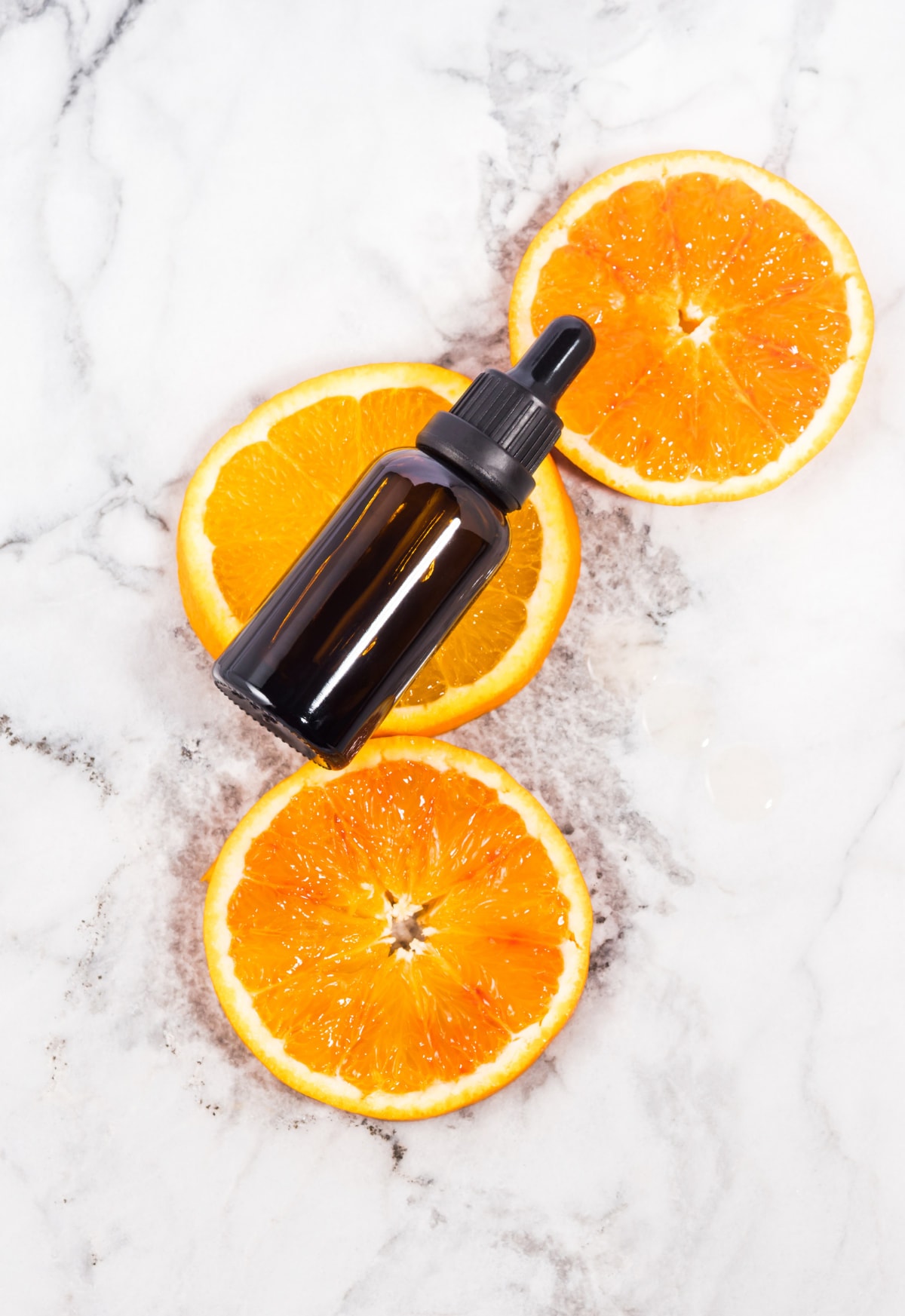
Glycolic acid and Vitamin C are power players when it comes to skincare. You’ve probably spotted them in numerous skin products, and for a good reason. They have proven benefits that can make your skin look and feel healthier and more refreshed.
Glycolic acid, a type of alpha-hydroxy acid (AHA), is a superstar in exfoliating, brightening, and refining the look of skin texture.
Meanwhile, vitamin C is a potent antioxidant that helps repair skin damage, brighten complexion, and promote collagen synthesis.
In essence, these ingredients can transform your skincare routine, addressing common skin concerns from aging, and sun damage, to dullness and uneven texture.
But what if you want to reap the benefit of both? Is it safe to combine glycolic acid and vitamin C? Pairing the wrong ingredients can have nasty effects on our skin…
So, let’s dive a little deeper and fully discover how you can correctly incorporate glycolic acid and vitamin C into your routine for a fresh and rejuvenated complexion.
Understanding Glycolic Acid’s Role
You’ve probably come across glycolic acid in various skincare products. But as vital as it seems, you might not fully comprehend its benefits on your skin. Let’s explore and unpack this notable skincare component.
What Is Glycolic Acid
Glycolic acid is a chemical exfoliant originating from sugar cane. It is an alpha hydroxy acid (AHA) with the smallest molecular size in the AHA family.
This means that even though its water-soluble nature dictates that it acts on the upper layers of the skin, it still penetrates deeper than the rest and is, therefore, the most potent.
Glycolic acid works by breaking down the bonds between cells in the upper layers of the skin. This leads to the shedding of dead skin cells and promotes cell renewal. This, in turn, stimulates collagen and hyaluronic acid production.
These impressive glycolic acid properties contribute to its fantastic skin benefits.
Benefits Of Glycolic Acid
1. Glycolic Acid Helps Treat Acne
Glycolic acid’s main action is exfoliating. It is, therefore, perfect for unclogging pores and preventing breakouts. Glycolic acid also boasts anti-inflammatory and antimicrobial properties that further aid in battling inflammatory acne.
2. Glycolic Acid Improves Hyperpigmentation
Glycolic acid is a powerful tool for correcting hyperpigmentation. By speeding up cell turnover, it actively diminishes the appearance of dark spots, melasma, and uneven skin tone, leaving you with a brighter complexion.
3. Glycolic Acid Reduces Acne Scars And Wrinkles
Glycolic acid is a true skin superstar, addressing aging concerns and acne scars effortlessly. Its collagen-boosting power works wonders against fine lines and wrinkles, maintaining skin firmness and elasticity, while its exfoliating prowess delivers smoother skin texture for a youthful appearance. But wait, there’s more!
Glycolic acid’s collagen-promoting ability fights aging and fills and smoothens depressed acne scars, creating a more even skin texture. Its gentle exfoliation softens the edges of raised scars, revealing a radiant and rejuvenated complexion.
Side Effects Of Glycolic Acid
Glycolic acid is a potent exfoliator and can potentially lead to side effects. This usually happens to sensitive skin when you use glycolic acid incorrectly or in high concentrations.
Potential side-effects of glycolic acid:
- Skin irritation
- Burning sensation
- Dryness
- Sun sensitivity
It is crucial to always pair glycolic acid with a soothing moisturizer and a high-SPF sunscreen!
The Benefits of Vitamin C for Your Skin

What Is Vitamin C
You may be baffled that vitamin C is considered a skincare ingredient. However, you’ll be thrilled to find out that Vitamin C is an excellent antioxidant powerhouse, well-known for its skin-boosting properties.
Vitamin C is the most abundant antioxidant on our skin, yet its concentration gradually decreases as we age. We do not produce vitamin C – we solely depend on the amount we take from food. Yet it is unclear how effective oral vitamin C is for the skin. This is where topical vitamin C products come to the rescue!
Vitamin C Benefits
1. Vitamin C Protects Against Environmental Stressors
Vitamin C is like a shield against harmful environmental stressors that can wreak havoc on your skin. As the most plentiful antioxidant in our skin, it collaborates with other antioxidants to fight off free radicals created by UV light exposure.
2. Vitamin C Has Anti-aging Properties
Say goodbye to fine lines and wrinkles! Vitamin C is here to boost collagen synthesis, the protein responsible for maintaining skin firmness and elasticity.
Not only does it stimulate collagen production, but it also prevents photoaging, keeping your skin looking youthful and vibrant.
3. Vitamin C Brightens The Skin
Vitamin C has an anti-pigmentary effect, meaning it can reduce unwanted dark spots and hyperpigmentation. By inhibiting the enzyme tyrosinase, which plays a role in melanin production, Vitamin C helps decrease melanin formation, resulting in a brighter and more even skin tone.
4. Vitamin C Is Anti-inflammatory
Vitamin C acts as an anti-inflammatory superhero by inhibiting the activation of pro-inflammatory cytokines. This makes it perfect for soothing conditions like acne vulgaris and rosacea. It’s also great for preventing post-inflammatory hyperpigmentation.
5. Vitamin C Replenishes Vitamin E
Vitamin C not only has incredible benefits but also works as a replenisher for Vitamin E. Vitamin E is another potent antioxidant that protects our skin’s collagen network and cell membranes from oxidative stress.
By teaming up, Vitamins C and E create a powerful duo, providing even more photoprotection.
| Vitamin C Benefits | Description |
|---|---|
| Promotes Collagen Production | Collagen helps maintain skin elasticity, reducing wrinkles and fine lines. |
| Brightens Complexion | Reduces the appearance of brown spots and sun damage, providing an even skin tone. |
| Protects Skin | Shields skin from harmful UV rays and pollutants due to its antioxidant properties |
Vitamin C Side Effects
Here are some potential vitamin C side effects you should be aware of when using this powerhouse ingredient:
- Redness
- Dryness
- Itching sensation
- Yellowish discoloration of the skin (rare)
- Hypopigmented hair
- Staining of clothes
Combining Glycolic Acid And Vitamin C

Can You Use Glycolic Acid and Vitamin C Together?
Now, the burning question is: Can glycolic acid and Vitamin C be used together? The answer is yes; they can be. Nonetheless, doing it correctly is crucial.
While Vitamin C can make your skin more sensitive to the sun, glycolic acid also increases your skin’s photosensitivity.
Additionally, both glycolic acid and vitamin C formulations have low pH. So, combining them in the same routine can lead to skin irritation, redness, and itchiness.
Hence, you should ideally use these skincare ingredients at different times of the day, like Vitamin C in the morning and glycolic acid at night, or use a product that combines both in a stable formulation.
But, why would you want to use glycolic acid and vitamin C together in the first place?
How Glycolic Acid And Vitamin C Work Together
Glycolic acid and vitamin C can be a very harmonious combo, enhancing each other’s benefits if used correctly.
Glycolic acid is a powerful exfoliator, cleansing the skin and opening up the pores. In other words, it prepares the skin for vitamin C, which will penetrate deeper into the skin to brighten and promote collagen production.
Both Vitamin C and Vitamin E boast powerful anti-aging and skin-brightening properties. When used together, they synergistically enhance each other’s effects, resulting in a more significant and impactful improvement in your complexion.
How To Combine Glycolic Acid and Vitamin C
Before we explore how to combine glycolic acid and vitamin C, let’s talk about vitamin C formulations.
There are several products containing Vitamin C. Some formulations contain the most unstable yet potent form of vitamin C. These products tend to have the most acidic pH.
Other formulations combine vitamin C with other ingredients to stabilize it. These products tend to contain less potent vitamin C and less acidic pH.
Now, you might be asking, why do we care about vitamin C pH? We do because combining two acidic ingredients in one skincare routine is a crime. Here is how to avoid it:
Use Glycolic Acid And Vitamin C In Different Times Of The Day
If you’re using potent Vitamin C with low pH, it’s best to avoid pairing it with glycolic acid in the same routine. The combination can lead to skin irritation, redness, and itchiness. Instead, use glycolic acid at night and Vitamin C in the morning, followed by sunscreen.
Use Less Potent Vitamin C With Glycolic Acid
If you’re using products with stabilized, less potent Vitamin C and a higher pH, you may be more flexible in combining them. To do this, apply glycolic acid first and allow it to absorb for at least 15-30 minutes.
This gap allows your skin’s pH to return to its natural levels. After that, apply your stabilized Vitamin C product to maximize its benefits without causing irritation.
Practical Tips For Using Glycolic Acid And Vitamin C
Combining glycolic acid and vitamin C is indeed a good idea. Nonetheless, it’s essential to do it correctly to avoid irritating your skin. Here are some tips to keep in mind:
- Patch Test: Like any new skincare product, it’s crucial to conduct a patch test first. By testing a small amount on a discreet area of skin, you’ll be able to judge how your skin responds before applying it to larger, more noticeable areas.
- Start Slowly: Gradually introduce the two substances into your routine. For instance, you might begin by using a glycolic acid cleanser and vitamin C serum every alternate day, then gradually build up to daily use as your skin tolerates it.
- Watch out for Irritation: If you start to see redness, rashes, or experience a stinging sensation, it’s a sign your skin may be reacting poorly to the combination. In this case, back off and consult with a dermatologist.
It’s worth noting that everyone’s skin is different, and what works well for one person may not work as effectively for another. Therefore, always listen to what your skin is telling you, and adjust your skincare routine accordingly.
Concluding Thoughts On Glycolic Acid and Vitamin C
Navigating the world of skincare can be complicated, but understanding the benefits of individual ingredients like glycolic acid and vitamin C brings clarity. Both of these ingredients wield incredible benefits for your skin, individually and combined.
On one hand, glycolic acid acts as an impressive exfoliator. It delves deep into your skin, freeing up clogged pores and removing dead skin cells. This aids in promoting cell turnover and combating skin dullness.
On the other hand, vitamin C, known for its antioxidant properties, defends against free radicals and sun damage. It helps boost collagen production and brightens your complexion.
These two powerful ingredients can be paired to form an integral part of your skincare routine. This combination is ideal for maximum rejuvenation. While glycolic acid aids in cellular turnover, vitamin C enhances your skin’s elasticity and brightness.
Nevertheless, you should keep in mind that both these ingredients are potent and could potentially irritate your skin, particularly if you have sensitive skin. So, make sure to use them correctly and listen to your skin’s reactions.
Grab your glycolic acid and vitamin C products and embark on the journey to a flawless complexion!
Frequently Asked Questions
